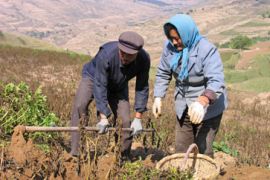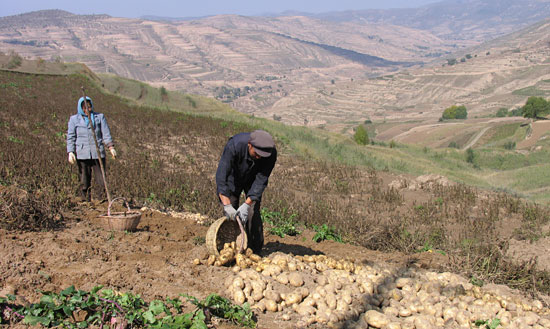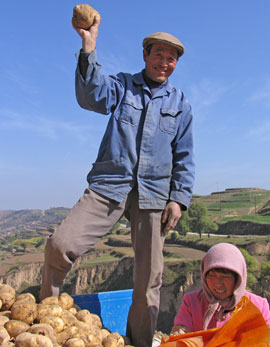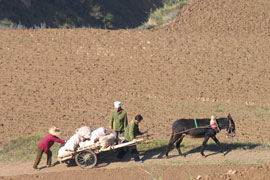China’s boom leaves farmers behind
Farmers feel the pinch as booming economy leaves them behind.

 |
| For farmer Jia Xiaowen and his wife, China’s wealth gap is a daily reality [Pictures by Joe Havely] |
Think of Chinese food and the first thing that springs to mind is probably not potatoes.
But in China’s rugged north-western province of Gansu, potatoes have been a staple crop for centuries.
| Gansu: Key facts |
|
Capital: Lanzhou GDP: Y192.814 bn (2005) Major industries: Agriculture, mining and electricity generation Gansu is also home to the Jiuquan space centre, launch site for China’s first manned space mission |
Like many farmers in this arid region, 43-year-old Jia Xiaowen, his wife Chen Xiulan, her elderly father and their three children rely on their potato crop to get by.
By the standards of China’s estimated 700 million peasants, the Jia family live a relatively comfortable life. They have a warm home, food on the table, and – for the time being at least – they are all in good health.
But like hundreds of millions of others, they are concerned about just how long it will last and whether, in the headlong rush for development, the rest of China will simply leave them behind.
In a good year Jia says his family can make about RMB10,000 ($1,330) – about average for rural families in this part of China’s poorest province.
“We used to worry about whether we would have enough to eat, where our next meal would come from,” Jia says as he harvests potatoes – some as big as grapefruits – from his fields.
“Now we worry about whether we’ll be able to afford to keep our children in school.”
This year though, things are a little bit harder. An ongoing drought that has struck much of northern China meant the family’s summer wheat harvest failed.
With luck, Jia reckons his potato crop will bring the family about RMB6,000.
Fast-growing divide
To put that in perspective, nationwide the average GDP per capita – not per family – is just over RMB16,000. In China’s boomtown of Shanghai, that figure rises to more than RMB55,000.
 |
| Potatoes are a staple crop for thousands of farmers in drought-hit Gansu |
This fast-growing divide between China’s rich cities and its poor countryside is one of the biggest challenges facing the ruling Communist party as it meets in Beijing to map out the country’s future and the party’s continued hold on power.
The showpiece 17th Party Congress under way this week in the capital seems a world away from rural Gansu, but it is here that Hu Jintao, China’s president, began his Communist party career and took his first steps into politics.
He spent 14 years in the province, an experience many say has given him a connection with the challenges facing rural China today.
For families like the Jias, one of the biggest challenges facing China’s farmers is inflation, a problem that is hitting the poor hardest.
According to the latest official figures, inflation fuelled by China’s breakneck economic growth is running at about 6.5 per cent – the highest for several years.
But many economists say the way consumer prices are measured is outdated and the real figure is closer to 20 per cent.
Surrendering land
The problem for farmers like the Jias is that the prices they are getting for their produce have barely changed over the past five years while prices for things they need keep going up, meaning they find it increasingly hard to keep up.
Gansu is also home to the Jiuquan space centre, launch site for China’s first manned space mission
Another major issue in Gansu is the impact of government efforts to combat soil erosion – the result of years of intensive farming and climate change.
As a result the Jia family and many others have recently had to surrender a large chunk of their land.
The family used to farm 24mu of land (about 1.5 hectares). Now they have to get by with just half that.
“Most of the people agree with this policy,” says Jia Xiaowen over a lunch of freshly made noodles. “We are not against it. We agree we should plant more trees and more grass. But the problem is if they can give us more compensation we’d be happier.”
They also worry where that compensation will go. It is a commonly heard story in many parts of China that money released by the central government ends up disappearing into the pockets of local officials.
A few kilometres down the road from the Jia farm is the bustling village market where the family’s potato crop is sold.
‘Harmonious society’
Nearby a large painted concrete sign urges residents to work hard to “build a harmonious society” – a trademark of Hu’s presidency.
 |
| The growing rural-urban wealth gap is the biggest challenge facing China’s leaders |
Eager to keep up his man-of-the-people credentials, Hu has visited the area twice in the past five years, most recently on the eve of the last Chinese New Year.
“He’s a good man,” says Ran Lin, a local chicken farmer and Communist party member.
“He’s done a lot of good things to help farmers with their tax burden and he’s helped a lot of kids go to school.”
Ran has done well in recent years and reckons his family earns about RMB50,000 a year, five times as much as the Jias.
But his rosy outlook is not shared by everyone. Ask around at the market and topping the list of worries on many minds is the soaring cost of healthcare.
Medical insurance used to be provided by the state, but in today’s era of “socialism with Chinese characteristics” that is not the case anymore.
“If you’re really sick, what are you going to do?” asks farmer Xhou Shuping. “If you’re really sick you cannot afford to see the doctor.”
Another concern is education – something that for most families in the area offers the only possible ticket for their children out of the cycle of poverty.
“Not everyone can afford education,” says Xhou whose son has joined China’s huge army of migrant workers seeking a better life in cities.
“Many children can’t afford to go to school – their life is still very difficult.”
Toughest challenge
In the city of Lanzhou, the provincial capital of Gansu, you can see how that cycle is playing out.
 |
| Jia says his biggest concern is seeing his children get a proper education |
Lanzhou’s economy is growing fast and like many cities across China it marches to the sound of jackhammers and construction.
Amid the smog of industrialisation, gleaming new office blocks, condominiums and shopping malls are springing up.
On the city’s street markets potatoes grown by the Jia family and their neighbours sell for more then twice the price they do back in the countryside.
Those that reach the supermarkets in Beijing and Shanghai sell for even more.
The middle men are taking all the profits and it is here that the promised trickledown of China’s economic boom hits a wall.
For Jia Xiaowen and his family there is little they can do but wait and see. “We’re not jealous of city people,” he says. “We’re farmers and we can’t compare with city people. We can’t and we don’t want to.”
The party of Mao Zedong came to power on the back of support from peasants like Jia and his family.
Today the Communist party power base has long since moved to the cities.
But as China’s leaders meet behind closed doors in Beijing, they know that their survival depends on keeping the Jia family and 700 million like them happy.
In order to keep their grip on power and build the much-touted “harmonious society”, China’s leaders will have to work hard to redress the balance and keep a lid on rural discontent.
After all, it was Mao who said that in China it is not the workers but the peasants who create revolution.
